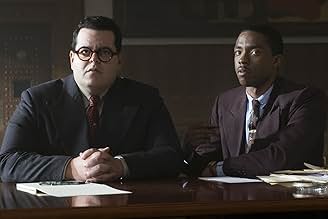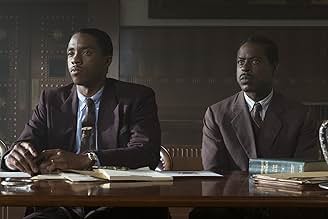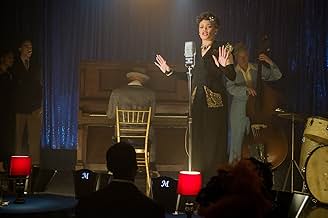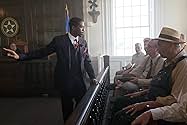L'histoire de Thurgood Marshall, l'avocat en croisade qui deviendra le premier juge afro-américain de la Cour suprême, alors qu'il se bat dans l'une des affaires qui détermineront sa carrièr... Tout lireL'histoire de Thurgood Marshall, l'avocat en croisade qui deviendra le premier juge afro-américain de la Cour suprême, alors qu'il se bat dans l'une des affaires qui détermineront sa carrière.L'histoire de Thurgood Marshall, l'avocat en croisade qui deviendra le premier juge afro-américain de la Cour suprême, alors qu'il se bat dans l'une des affaires qui détermineront sa carrière.
- Nommé pour 1 oscar
- 5 victoires et 21 nominations au total
- John Strubing
- (as Jeremy Lowell Bobb)
Avis en vedette
Thurgood Marshall in his career litigated many major civil rights cases including the most famous of all Brown vs. Board Of Education in 1954 that integrated the school system nationwide. Later on his career was capped by becoming the first black justice on the Supreme Court.
This story takes place in the late 30s by the music and the radio broadcasts with the news of the day. Thurgood Marshall has been sent to Connecticut to defend Sterling K. Brown a black chauffeur on a charge of raping his employer Kate Hudson.
This may be the north, but the racial attitudes in Greenwich, Connecticut are only more subdued than they are in Alabama. Fairfield County in those days in the richer suburban towns are pretty bad. You remember from Auntie Mame the phrase, Aryan from Darien. They're not crazy about Jews either.
Marshall being an outsider to the state has to be admitted to the Connecticut bar. Local attorney Sam Friedman played by Josh Gad is the lead counsel temporarily and the first motion is to get Marshall admitted. That is usually a pro forma thing, note how Matt Damon has to be admitted to the bar in Tennessee in The Rainmaker.
Such courtesy is denied Marshall by Judge James Cromwell. But he's allowed to sit at the defense table and coach Friedman. Despite a few curves thrown at the defense Gad who only did civil cases before this for insurance companies proves to be a pretty good advocate.
Boseman steps up to his role just as he did with Jackie Robinson and James Brown. He also has some wonderful domestic scenes with his wife Keesha Sharp and at a nightclub with Jussie Smollett and Chilli Thomas as Langston Hughes and Zora Neale Hurston. Good performances you think these are the real people.
Thurgood Marshall was also portrayed on screen by Sidney Poitier in the film Separate But Equal dealing with the school integration cases right up to the Supreme Court. These two really ought to be seen back to back for a full assessment of Marshall's career.
In his time when Lyndon Johnson appointed Marshall to the Supreme Court it wasn't just race that made Marshall's appointment unique. It was the whole level of experience in the kind of law he practiced for people like Sterling K. Brown. The goal is justice and the law has to work for all for justice to be realized.
Marshall is a film not to be missed.
So there was high hopes for this bio-pic about NAACP Civil Rights lawyer and first black supreme court justice Thurgood Marshall.
The film looks at one of the first cases of his career; a black chauffeur accused of rape by his white employer in Connecticut. Josh Gad is also in the film as a Jewish lawyer roped into being lead on the case when a judge decrees Marshall can only assist. This is important as the Gadd character has never tried a criminal case before.
You keep expecting Boseman to get that nomination sooner or later, "Get on Up" should have been his ticket, but "Marshall" while pretty good in most areas, just doesn't feel like it has enough weight to it.
I wish they did go with a bigger case of his, or just go all out and go with the one he's known most for- Brown v. Board of Education.
The movie becomes another case of a black man being railroaded by a biased and corrupt system built on fabrications. For some that may be enough to hold them; the court room scenes that take up most of the movie are often rousing if not predictable.
This is all pretty easy-going though- by the second half it's pretty much a comedy the lengths most of the white people in this movie will go to to hide their prejudices.
At times it almost feels like their trying to start a Thurgood Marshall movie Universe here- like this one may not be that good but we'll tease you with some of the better stuff to come if you want it.
But even so, Boseman brings life to this character, whether it's Marshall's perceptiveness or his gift of gab, he's cool because he knows he's the smartest guy in the room at any given time.
Josh Gad has his moments but he still can't seem to fully get out of the goofy sidekick role. We'll have to see how he does in "Murder on the Orient Express".
Oddly enough this is a bio-pic that comes across more as a crowd-pleasing good time than something that's going to be remembered at the end of the year, which is fine.
I laughed, I was invested in the court trial mostly, the performances, including from Sterling K. Brown as the chauffeur are very good. Yet you just feel like it should have done more.
So the score is 7 out of 10. If you guys liked this, check out Craig James Capsule Reviews on Youtube for more.
Chadwick Boseman has taken on film versions of such icons as Jackie Robinson in 42 and James Brown in GET ON UP, so he likely jumped at the chance to play the revered figure, Thurgood Marshall. Mr. Boseman has true movie star screen presence, and supplies the young Mr. Marshall with a self-assured swagger that accompanies a brilliant legal mind – a mind that refused to be ignored during a time it was desperately needed. Lest he be labeled a superhero, the film does portray Marshall smoking and drinking, while also hinting at his carousing. The common flaws of a great man.
It's 1941 and the young (33 years old) Marshall is the lone NAACP attorney, so he spends his time ping-ponging around the country fighting for fair trials for those African-Americans accused simply because they aren't white. He works only for "innocent" people and his efforts during this time were crucial to the Civil Rights movement gaining attention and legitimacy. Most of the film centers on a case in Connecticut (no, not the Jim Crow south) where a black man, Joseph Spell (Sterling K Brown), is accused of sexual assault of a "respectable" married white woman, Eleanor Strubing (Kate Hudson). If you are reminded of the great book and film TO KILL A MOCKINGBIRD, you must know that those literary and cinematic standards are such that few can ever hope to reach.
What follows is not one of the more dramatic or tension-filled cinematic courtroom dramas. There is simply too much levity for the film to be classified as a historical heavyweight. That said, the man and his story are fascinating, and though director Reginald Hudlin chooses a deft touch rather than a sledge hammer, it's likely the wise choice if the goal is to entertain, while also educating the masses to Marshall's early career. Josh Gad co-stars as Marshall's co-counsel Sam Friedman, a specialist in legal technicalities within the insurance industry. Boseman and Gad have nice chemistry (at times it feels like a buddy movie), and as a Jew in those times, Friedman is himself stuck in limbo between staunch racism and acceptance by the white community.
James Cromwell plays Judge Foster, yet another man caught between the old world he has lived in his entire life and the fast-changing society and legal system that permits him to silence Marshall, while also forcing (somewhat) fair treatment of the accused Spell. Dan Stevens (BEAUTY AND THE BEAST) is Loren Willis, the disgusted and disgusting prosecutor. This character is so cartoonish that the only thing missing is a neon necklace that flashes "racist" as he speaks. Sophia Bush has a brief, yet important scene and Sterling K Brown (as Mr. Spell) has the film's most heart-breaking moment as he sits on the stand and explains why he lied.
Director Reginald Hudlin seems like an odd choice for the project. He has been working mostly in TV since back-to-back-to-back bombs BOOMERANG (Eddie Murphy), THE LADIES MAN (Tim Meadow) and SERVING SARA (Matthew Perry). Mr. Hudlin has experienced more success as a Producer, having been Oscar nominated for DJANGO UNCHAINED. Here he works with the father and son screenwriters Jacob Koskoff and Michael Koskoff. The elder Michael is a well respected criminal attorney and legal historian, and certainly understands the expectations that come with offering a public look at a near- mythical figure especially one as revered as Thurgood Marshall.
This isn't so much a movie about the icon as it is about a young man on the path to greatness and importance (he served on the Supreme Court from 1967-1991). The soundtrack is filled with jazz which complements the light-hearted approach, and further distances from any semblance of "heavy" or "historical". Director Hudlin adds a contemporary touch by having Trayvon Martin's parents (Sybrina Fulton, Tracy Martin) appear in a scene near the end. On the downside, multiple upshot camera angles are designed to make his lead character look larger than life. The truth is, Thurgood Marshall required no help in looming large. Hopefully this mainstream approach pays off and many are introduced to the legacy of a man who is more than worthy of this movie and another.
Kudos entire cast was riveting!
Le saviez-vous
- AnecdotesBoth Chadwick Boseman and Thurgood Marshall went to Howard University.
- GaffesIn the early 1940s, Marshall gives Friedman, whose experience is in civil law, books to get him up to speed on criminal law. However, none of the books focus on criminal law. The first, A Concise Restatement of Torts, Second Edition, about civil law, was published in 1965. The two volumes of Wigmore on Evidence are the McNaughton Revision, published in 1961. Evidentiary law discussed in Wigmore applies in both criminal and civil cases, so Friedman, a trial lawyer, would already be familiar with it. The fourth was Volume 308 of the United States Reports, which published all the US Supreme Court opinions for the 1939 October term.
- Citations
Thurgood Marshall: The Constitution was not written for us. We know that. But no matter what it takes, we're going to make it work for us. From now on, we claim it as our own.
- ConnexionsFeatured in Andra Day Feat. Common: Stand Up for Something (2017)
- Bandes originalesKeep a Knockin'
Written by J. Mayo Williams, Robert Mays (as Bert Mays)
Courtesy of Universal Music Publishing
Performed by Louis Jordan & The Tympany Five (as Louis Jordan & His Tympany Five)
Courtesy of Geffen Records under license from Universal Music Enterprises
Meilleurs choix
- How long is Marshall?Propulsé par Alexa
Détails
- Date de sortie
- Pays d’origine
- Site officiel
- Langue
- Aussi connu sous le nom de
- Marshall
- Lieux de tournage
- sociétés de production
- Consultez plus de crédits d'entreprise sur IMDbPro
Box-office
- Budget
- 12 000 000 $ US (estimation)
- Brut – États-Unis et Canada
- 10 051 659 $ US
- Fin de semaine d'ouverture – États-Unis et Canada
- 3 000 805 $ US
- 15 oct. 2017
- Brut – à l'échelle mondiale
- 10 116 816 $ US
- Durée1 heure 58 minutes
- Couleur
- Mixage
- Rapport de forme
- 2.00 : 1
Contribuer à cette page































